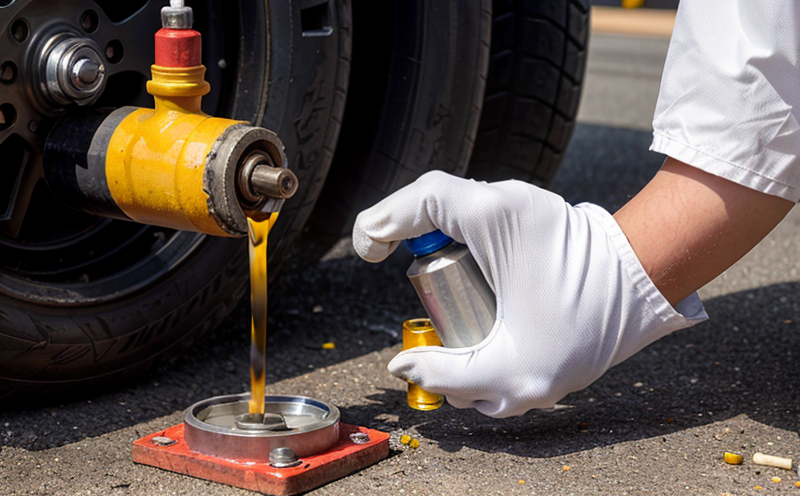Fuel, Oil & Lubricant Testing
In the marine and ship equipment sector, fuel, oil, and lubricant testing is a critical component of ensuring operational efficiency, compliance with international standards, and environmental sustainability. The quality and performance of these fluids directly impact the reliability and longevity of machinery on board ships. This article delves into various aspects of fuel, oil, and lubricant (FOL) testing, providing insights that are essential for those involved in managing, developing, or procuring marine equipment.
The testing process involves a series of rigorous evaluations aimed at identifying the physical properties, chemical composition, and performance characteristics of fuels, oils, and lubricants. This testing ensures that these fluids meet the stringent requirements set by international standards such as ISO, ASTM, and EN. For instance, ISO 8217 specifies fuel oil quality for use in marine diesel engines, while ASTM D4950 provides guidelines on lubricating oils used in marine applications.
Key tests include viscosity measurement (ASTM D445), flash point determination (ASTM D93), sulfur content analysis (ASTM D2413), and pour point evaluation (ASTM D97). These tests are performed using advanced laboratory equipment like viscometers, calorimeters, and chromatographs. The results of these analyses provide crucial data on the fluid's ability to lubricate effectively, prevent wear and tear, and resist degradation under harsh marine conditions.
The importance of FOL testing cannot be overstated in today’s global maritime industry. Ships operate in diverse environments with varying climatic conditions, making it essential to ensure that all fluids used are optimized for performance. For example, the right lubricant can significantly reduce wear on bearings and gears, extending their service life and minimizing maintenance costs. Similarly, selecting the appropriate fuel can enhance engine efficiency and reduce emissions.
Adhering to international standards not only ensures compliance with regulations but also enhances a ship’s reputation for reliability and sustainability. For quality managers and procurement officers in this sector, understanding these tests is vital for making informed decisions that align with broader business goals. R&D engineers benefit from detailed test reports as they refine formulations and improve product performance.
Moreover, the environmental impact of FOL testing cannot be ignored. Properly conducted tests help minimize waste generation by ensuring that only fluids meeting stringent criteria are utilized. This approach supports sustainability initiatives aimed at reducing marine pollution and promoting eco-friendly practices within the industry.
Why Choose This Test
Selecting a reliable laboratory for FOL testing is crucial to ensure accurate results that meet international standards. Our state-of-the-art facilities equipped with cutting-edge technology provide precise measurements and analyses, giving you confidence in the data generated. Here are several reasons why choosing our service is advantageous:
- Compliance Assurance: We adhere strictly to international standards like ISO 8217 for fuel oils and ASTM D4950 for lubricants, ensuring your products meet regulatory requirements.
- Precision & Reliability: Our experienced technicians use advanced instruments such as viscometers, calorimeters, and chromatographs to deliver accurate results every time.
- Expertise & Experience: With years of experience in marine testing, our team understands the unique challenges faced by this sector and can provide tailored solutions.
- Comprehensive Reporting: Our detailed reports offer insights into not just compliance but also potential areas for improvement, helping you stay ahead in the competitive market.
- Customer Satisfaction: We prioritize customer needs, offering flexible service options to meet your specific testing requirements. Our dedicated team ensures timely delivery of results and robust support throughout the process.
By choosing our FOL testing services, you invest in a partner committed to excellence and innovation, ensuring that your marine equipment performs at its best under all conditions.
Customer Impact and Satisfaction
The impact of reliable fuel, oil, and lubricant testing extends beyond compliance; it directly influences customer satisfaction across the maritime industry. By providing accurate and consistent results, we help ensure that ships operate efficiently, safely, and sustainably. Here’s how our services contribute to customer satisfaction:
- Enhanced Performance: Properly tested fluids optimize machinery performance, reducing breakdowns and maintenance downtime.
- Cost Savings: By preventing premature failures through regular testing, customers experience reduced operational costs associated with repairs and replacements.
- Environmental Benefits: Sustainable practices adopted in our testing processes help minimize waste and reduce the environmental footprint of marine operations.
- Regulatory Compliance: Ensuring adherence to international standards promotes a positive image among stakeholders, enhancing customer trust and satisfaction.
- Innovation Support: Our insights into fluid performance aid R&D efforts, driving innovation in product development and enhancement.
Our commitment to excellence is reflected in the high levels of customer satisfaction we consistently achieve. By partnering with us, you gain access to world-class expertise that translates into tangible benefits for your business.
Environmental and Sustainability Contributions
The environmental impact of fuel, oil, and lubricant testing is a crucial aspect of our service offering. By adhering strictly to international standards and employing advanced technologies, we minimize waste generation and promote sustainable practices within the industry:
- Eco-Friendly Processes: Our laboratory processes are designed to reduce energy consumption and generate minimal waste.
- Resource Conservation: Through precise testing, we ensure that only fluids meeting stringent criteria are used, thus conserving resources and reducing unnecessary production.
- Pollution Reduction: By optimizing fluid performance through regular testing, ships contribute less to marine pollution, promoting a healthier environment.
- Energy Efficiency: Properly tested fuels enhance engine efficiency, leading to lower emissions and reduced fuel consumption.
Our dedication to sustainability is not only beneficial for the environment but also aligns with global initiatives aimed at reducing carbon footprints. By choosing our services, you support a greener future in marine operations.





